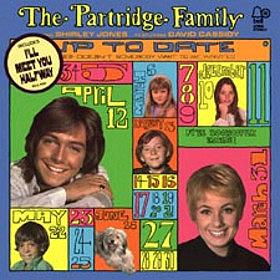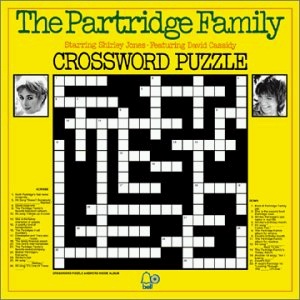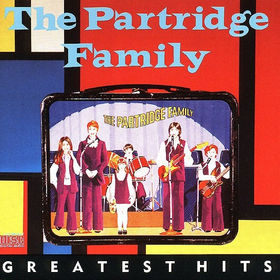
The Partridge Family is an American musical sitcom created by Bernard Slade, which was broadcast from September 25, 1970 to August 24, 1974 on ABC.

David Bruce Cassidy was an American actor and musician. He was best known for his role as Keith Partridge, the son of Shirley Partridge, in the 1970s musical-sitcom The Partridge Family. This role catapulted Cassidy to teen idol status as a superstar pop singer of the 1970s.

The Partridge Family Album is the first of eight studio albums by The Partridge Family. The LP was released in October 1970, a month after the debut of the ABC-TV musical sitcom The Partridge Family starring Shirley Jones and featuring David Cassidy, both of whom feature on the album, as do studio backing vocalists and session musicians. The success of the album – which in early January 1971 reached no. 4 on Billboard's Top LP's chart – was bolstered not only by the hit TV show but by the album's one single release, the massive hit "I Think I Love You", which for three weeks in November and December 1970 topped Billboard's Hot 100 and which NARM declared best-selling single of 1970.

Up to Date is the second studio album by The Partridge Family. Released in February 1971, just four months after the group's debut LP, the album entered Billboard's Top LP's chart in early April, having been certified gold on 25 March 1971. In its fourth week on the Top 200, the album improved on its predecessor, reaching no. 3.

The Partridge Family Sound Magazine is the third studio album by TV-linked pop project The Partridge Family. Released in August 1971 before the start of the second season of the US TV series, it was their third hit album in ten months. In late September 1971, in its fifth week on Billboard's Top LP's chart, the album reached its no. 9 chart peak. In that same week the album's one hit single release, "I Woke Up In Love This Morning", peaked at no. 13 on Billboard's Hot 100. The LP was certified gold that same month. Sound Magazine is nearly universally regarded – by both fans and critics – as the Partridge Family's consummate pop album.

Shopping Bag is the fifth studio album by TV-linked pop project The Partridge Family. Released in March 1972, just as the second season of the TV series was finishing in North America, the album entered Billboard's Top LP's chart in late March, peaking at no. 18 in late April. The album remained in the Top 200 for 17 weeks and was certified gold. The vinyl release of the album contained a novelty plastic shopping bag.

Crossword Puzzle is the seventh and penultimate studio album by The Partridge Family. Released in June 1973, it was the last Partridge Family album to chart in the US, entering Billboard's Top LP's chart in July and peaking at no. 167 in its second of just five weeks in the Top 200. Bell Records, losing faith in the group after oversaturating the market with product, chose not to release a US single from the album, though "Sunshine" was released as a single in Japan.

Bulletin Board is the eighth and final studio album by The Partridge Family, released by Bell Records in October 1973. The album was recorded between July and September 1973. Bulletin Board was the first Partridge Family album to fail to chart on Billboard's Top LP's chart. "Looking for a Good Time" b/w "Money Money" was released as a single in November 1973, but failed to chart. This was the last regular U.S. Partridge Family single.

The Partridge Family Notebook is the sixth studio album by The Partridge Family. Released in November 1972, the album entered Billboard's Top LP's chart in December, peaking at no. 41 in January 1973 – the same week in which its lead single, a cover of Barry Mann and Cynthia Weil's "Looking Through the Eyes of Love", peaked at 39 on Billboard's Hot 100. The album remained in the Top 200 for 16 weeks, and was the first by the Partridge Family not to reach the Top 40.

A Partridge Family Christmas Card is a Christmas album by the Partridge Family, released in November 1971. The album's case contains a reproduction of a Christmas card signed by the whole Partridge Family, the stars of a 1970s sitcom. The song "My Christmas Card to You" was original, but the remainder of the tracks were standards. Like most of the Partridge Family songs, the lead vocals are sung by David Cassidy, who played Keith Partridge in the show. The album also features one of the few Partridge Family recordings featuring Shirley Jones as the lead singer.

Rock Me Baby is the second solo album release from David Cassidy. It was produced by Wes Farrell for Bell Records, and released in 1972. The album introduced some rock, soul and R&B flavors in a calculated move by Cassidy to expand beyond his teen idol image. AllMusic's Al Campbell wrote that the blue-eyed soul album was officially produced by Farrell, but the song selections and styles showed that Cassidy was also making decisions.

Old Trick New Dog is a 1998 album from David Cassidy on his own Slamajama Records label. In addition to new songs, it also features several remakes of songs from The Partridge Family. The single lifted from the album – No Bridge I Wouldn't Cross – was an Adult Contemporary Top 25 hit in the USA. The track You Were The One was co-written by David Cassidy and Tony Romeo who wrote many of the most popular songs for Cassidy and The Partridge Family in the 1970s, including I Think I Love You, Summer Days, I Am A Clown and Sing Me.

"I Think I Love You" is a song by Tony Romeo, written as the debut single for fictional musical TV family the Partridge Family, released in August 1970, a month prior to the debut of the ABC-TV musical sitcom The Partridge Family starring Shirley Jones and featuring David Cassidy, both of whom appear on the record, with Cassidy as lead vocalist. The single topped Billboard's Hot 100 for three weeks in November and December 1970 and later was certified by NARM as the best-selling single of 1970.

Then and Now was David Cassidy's 16th solo album, released in 2002. It became a big hit in the UK, where it reached #5 in the album charts and ultimately achieved Platinum sales status. It contained new recordings of songs previously released in other albums.
Wes Farrell was an American musician, songwriter and record producer, who was most active in the 1960s and 1970s.

Greatest Hits is a greatest hits album by The Partridge Family released by Arista in 1989. It contains 16 songs, including the TV show's second theme song, "Come on Get Happy" which was never featured on a Partridge family album, and two songs by David Cassidy as a solo act: "Cherish" and "Could It Be Forever". It has liner notes by Danny Bonaduce and a Partridge Family trivia quiz. The cover has a picture of a period lunchbox with a cartoon picture of the family in red velvet suits.
Tony Romeo was an American songwriter. He is best known for writing the number 1 hit "I Think I Love You" by The Partridge Family as well as many other hit records, mostly during the 1960s and 1970s.

Lulu is a 1973 album by Scottish singer Lulu. It was her first album on Chelsea Records. Produced by American songwriter Wes Farrell, the lead single was "Make Believe World". It also included covers of "Groovin'", "Do Right Woman, Do Right Man" and David Cassidy's "Could it Be Forever". The album failed to chart, although Lulu came back to prominence a few months later with the release of the hit single "The Man Who Sold the World". The single reached No.3 in the UK and became one of the singer's biggest hits, but was not included on this album. Although the album met with little chart success, reviews were good, with Allmusic retrospectively calling it "top class".

The discography of David Cassidy, an American pop artist, consists of twelve studio albums, three live albums, six compilation albums, three soundtrack albums and twenty-four singles. David Cassidy started recording albums in 1970. His career is most notable for his solo music and his recordings with the Partridge Family.

Greatest Hits is a compilation album by David Cassidy, initially released in 1974 by Bell Records.


















